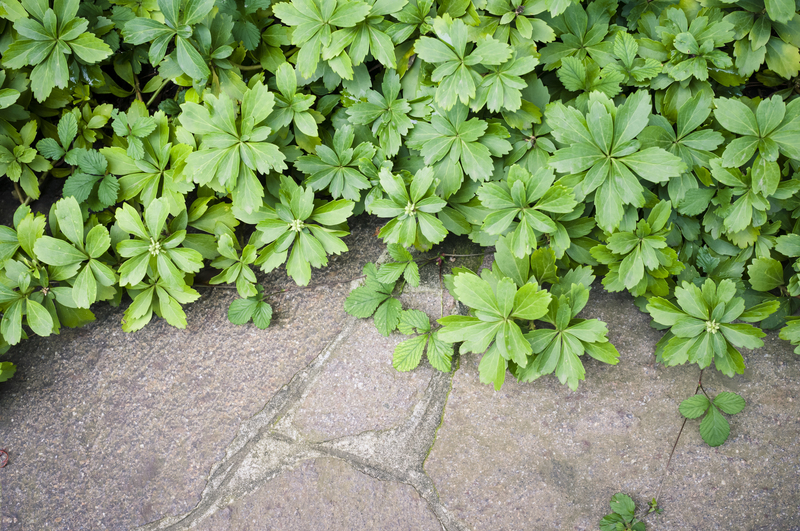Organic Waste: A Sustainable Path to Fertilized Soil
Posted on 11/06/2025
Organic Waste: A Sustainable Path to Fertilized Soil
Introduction
Organic waste is more than just kitchen scraps and garden clippings--it's a powerful resource that, when managed responsibly, can transform barren land into rich, fertilized soil. In today's age of environmental consciousness, understanding the potential of organic waste in sustainable agriculture and gardening is crucial. This comprehensive article delves into how harnessing organic waste offers a sustainable path to cultivating healthier soils while promoting eco-friendly waste management.

What Is Organic Waste?
Organic waste refers to any type of biodegradable material derived from living organisms. Typical examples include food scraps, yard trimmings, paper products, wood, and other plant or animal-based matter. Unlike inorganic waste, these materials naturally decompose and are ideal for recycling back into the environment.
- Food waste: vegetable peels, fruit rinds, leftover meals
- Garden clippings: grass, leaves, twigs
- Paper and cardboard: uncoated and non-glossy
- Manure: from herbivorous animals
Properly managed, this waste stream can be converted into a valuable resource for soil fertility, closing the loop between consumption and environmental renewal.
Why Proper Management of Organic Waste Matters
The increasing volume of organic waste generated globally presents both a challenge and an opportunity. Improper disposal of organic waste in landfills leads to the emission of greenhouse gases such as methane, contributing to climate change. On the other hand, recycling organic materials improves soil health, boosts agricultural yields, and reduces dependence on chemical fertilizers.
Environmental Benefits of Recycling Organic Materials
- Decrease in landfill waste--reducing the strain on municipal landfills
- Reduction of greenhouse gas emissions by preventing anaerobic decomposition
- Enrichment of soil with essential nutrients
- Promotion of sustainable farming practices
The Journey: From Organic Waste to Fertilized Soil
The transformation of organic refuse into nutrient-rich soil involves several key processes. Let's explore the steps that make organic waste recycling a cornerstone of sustainable soil management.
Step 1: Collection and Separation
Effective recycling begins with the proper separation of organic waste from other trash streams. Households, restaurants, farmers, and municipalities can all contribute by keeping compostable materials apart from plastics, metals, and hazardous substances.
- Curbside organics collection programs
- Dedicated compost bins in homes and businesses
- Community drop-off centers for garden and food waste
Step 2: Composting and Anaerobic Digestion
Once separated, organic waste undergoes controlled decomposition processes such as composting (aerobic) or anaerobic digestion.
- Composting: The decomposition of organic matter in the presence of oxygen, resulting in *humus-rich compost* suitable for soil enrichment.
- Anaerobic Digestion: The breakdown of waste in the absence of oxygen, producing biogas for energy and a nutrient-dense digestate for use as fertilizer.
Both methods break down complex organic materials into simpler compounds, ideal for revitalizing depleted soils.
Step 3: Maturation and Application
After composting, the material matures over several weeks to months, resulting in a stable, crumbly product. This organic soil amendment can be:
- Mixed into garden beds to boost plant growth
- Used as a top dressing for lawns and crops
- Blended into potting soils for indoor plants
Applying compost or digestate to soil returns valuable nutrients, enhances soil structure, and improves water retention--essential steps for sustainable agriculture and landscaping.
How Organic Waste Enriches Soil
Enriching soil with recycled organic waste brings both immediate and long-term benefits. These improvements go beyond simple fertilization--they transform the entire ecology of the soil.
Nutrient Recycling and Soil Fertility
- Macronutrients: Compost provides nitrogen, phosphorus, and potassium--essential elements for robust plant growth.
- Micronutrients: Nutrients like calcium, magnesium, iron, and zinc support plant health and are often lacking in synthetic fertilizers.
- Humic substances: These organic compounds improve nutrient retention and make minerals more accessible to plant roots.
Improved Soil Structure and Water Management
The addition of organic matter from kitchen scraps and plant debris enhances soil texture. This results in:
- Improved aeration and root penetration
- Greater water retention during dry periods
- Better drainage to prevent waterlogging and root diseases
Promotion of Soil Biodiversity
By introducing organic waste compost, soil becomes teeming with life, including earthworms, beneficial bacteria, and mycorrhizal fungi. These organisms promote healthy plant growth by:
- Breaking down organic materials into nutrients
- Guarding against harmful pests and pathogens
- Improving soil structure through their biological activity
Practical Ways to Use Organic Waste for Fertilizing Soil
Home Composting
Even without access to municipal composting facilities, individuals can adopt home composting to turn kitchen and yard waste into "black gold." Tips for effective composting include:
- Using a balance of "green" (nitrogen-rich) and "brown" (carbon-rich) materials
- Turning the pile regularly to provide oxygen and promote even decomposition
- Maintaining moisture--compost should feel like a wrung-out sponge
In just a few months, households can reduce landfill waste and create a ready supply of eco-friendly fertilizer for gardens and plants.
Vermicomposting: Composting with Worms
Another innovative approach is vermicomposting, where earthworms break down food scraps into worm castings--a nutrient-rich form of organic fertilizer. Ideal for urban dwellers or those with limited space, worm bins efficiently process small amounts of organic waste year-round.
Mulching with Organic Waste
Not all organic waste needs to be composted first. Grass clippings, shredded leaves, and kitchen scraps can be used as mulch around trees, garden beds, and shrubs. This suppresses weeds, retains soil moisture, and gradually decomposes to feed the soil.
Farm-Scale Organic Waste Management
On a larger scale, farms can recycle crop residues, manure, and processing waste using composting windrows, digesters, or even direct application to fields. This closed-loop method sustainably restores soil health, reduces input costs, and supports organic certification requirements.
Organic Waste vs. Synthetic Fertilizers: A Comparative Analysis
While both organic and synthetic fertilizers aim to enhance soil fertility, their approaches and long-term impacts differ significantly.
Advantages of Organic Waste-Based Amendments
- Sustained nutrient release: Compost offers slow and steady nutrient availability, reducing the risk of leaching.
- Enhanced microbial activity: Organic fertilizers support healthy soil ecosystems.
- Safe for humans, animals, and beneficial insects
- Reduces greenhouse gases by diverting waste from landfills
Limitations of Synthetic Fertilizers
- Can cause nutrient runoff and water pollution
- May diminish soil organic matter over time
- Often reliant on non-renewable resources
For sustainable agricultural practices and resilient food systems, organic waste composting is increasingly recognized as the superior path towards fertilized soil.
Implementing Organic Waste Solutions: Community and Policy Perspectives
Community Involvement and Education
Widespread adoption of organic waste recycling requires collaboration at every level--from households to urban planners. Public education campaigns, school programs, and demonstration gardens can build awareness of the benefits and methods of sustainable soil enrichment.
Policy Support and Infrastructure
Municipalities play a significant role by:
- Providing collection and processing services for organics
- Offering incentives for composting and zero-waste behavior
- Enforcing landfill diversion targets to encourage organic recycling
Forward-thinking policies empower communities to realize the full potential of organic waste in agriculture and landscaping, making eco-friendly soil management the norm.
Challenges and Solutions in Organic Waste Utilization
While the advantages are clear, scaling up organic waste recycling systems comes with obstacles:
- Lack of awareness and education among the public
- Contamination of compostable material with plastics or chemicals
- Infrastructure gaps for large-scale collection and processing
- Costs of establishing new compost facilities
Overcoming Barriers for Sustainable Success
Success depends on a mix of grassroots action and policy intervention:
- Educational programs in schools and community centers
- Clear labeling of compostable materials for easy sorting
- Incentives and subsidies for local compost businesses
- Investment in research to improve composting technology
Together, these efforts ensure that the benefits of organic waste for soil fertilizers are accessible to everyone.

Future Prospects: Innovations in Organic Waste for Fertilized Soil
The future of organic waste recycling is bright, with new technologies and business models emerging rapidly. Innovations include:
- Smart composting bins that monitor moisture and temperature with sensors, optimizing decomposition and minimizing odors.
- Decentralized composting hubs for cities, reducing transportation costs and increasing community engagement.
- Advanced bio-digesters that convert organic waste into both fertilizer and renewable energy.
- Integration with vertical farming and controlled environment agriculture for efficient nutrient cycling in urban environments.
With continued research and development, the path towards a circular, sustainable organic waste ecosystem--feeding the soil and reducing environmental impact--is within reach.
Conclusion: Embrace the Sustainable Path Today
Organic waste is much more than refuse--it's an investment in the health of our planet. By adopting practices that transform household scraps and green waste into fertilized soil, we not only enrich our gardens and farms but also advance the cause of sustainability. Whether you're a home gardener, farmer, policymaker, or concerned citizen, taking action to recycle and repurpose organic materials is a simple yet powerful step towards a healthier, greener world. Start your journey to sustainable soil today--nature, and future generations, will thank you.
Latest Posts
Minimal Effort, Maximum Impact: 5 Budget Garden Hacks
Eliminating Carbon Footprints Through Gardening
Your Pathway to Year-Round Freshness with Herb Growing

